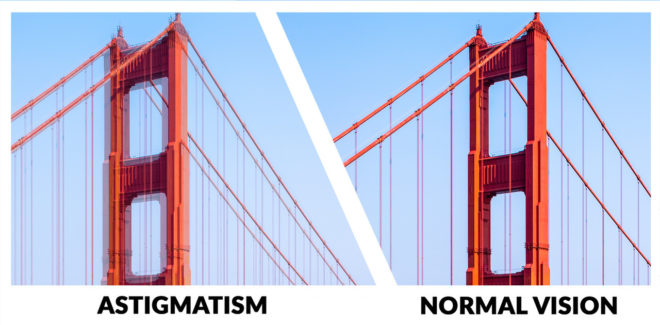
Astigmatism is a commonly misunderstood term; it is not an eye disease, but a refractive error similar to farsightedness or nearsightedness. Astigmatism is the most common type of prescription found when determining the power someone needs for glasses or contacts.
Astigmatism is an extremely common eye condition that concerns your cornea - the front, clear cover of the eye. When the cornea is irregularly shaped, light cannot properly reach the retina. This results in blurred vision, regardless of whether you’re nearsighted or farsighted. Due to the reduced ability to bend light appropriately, moderate to severe amounts of astigmatism can also cause eye discomfort and headaches. In many cases, farsightedness or nearsightedness accompanies astigmatism, further affecting both eyes’ capability to refract light. Many patients have been told that they cannot get LASIK with astigmatism, but this is an outdated statement. For over a decade the technology has existed to correct astigmatism with LASIK and PRK.
The short answer is yes, you can get LASIK with astigmatism, and our LASIK surgeons correct astigmatisms on a regular basis. Thanks to advancements in technology over the past decade, people with astigmatism are now likely to be great LASIK or PRK candidates. The investments Providence Eye has made in the most recent state-of-the-art, FDA-approved technology, combined with our surgeons’ extensive vision correction surgery experience, enable us to provide outstanding results for patients with astigmatism. If your regular eye doctor tells you that you cannot get LASIK with astigmatism, don’t be discouraged. Only a LASIK surgeon can properly evaluate you to determine if LASIK can correct your astigmatism and/or nearsightedness or farsightedness.
There are some corneal diseases, such as keratoconus, that can cause a patient to have astigmatism due to overall cornea instability. Keratoconus causes a gradual weakening of the corneal tissue that causes patients to develop larger amounts of astigmatism over time. In this specific case, neither LASIK nor PRK should be performed because it would compromise the already fragile corneal structure.
A proper LASIK consultation should always include corneal mapping and an examination by the actual LASIK surgeon, not an optometrist or technician. At Providence Eye & Laser Specialists, we use the state-of-the-art Pentacam corneal mapping device. In a matter of a couple of seconds, it takes tens of thousands of images of your cornea which come together and form the map of your cornea (much like a topography map). This shows the LASIK surgeon the cornea’s shape, thickness, and structural integrity so they can determine if you can get LASIK with astigmatism.
If you have astigmatism and have wondered about having laser eye surgery, contact our office and schedule a free consultation. As part of our thorough consultation, we will utilize the Pentacam corneal mapping device to map your cornea. Dr. Nunnery will then personally examine your vision, health of your eyes, analyze your corneas and give you their recommendation for the best outcome.
Book your complimentary consultation with Dr. Nunnery today and learn if you are a good candidate for LASIK or PRK to correct your astigmatism.